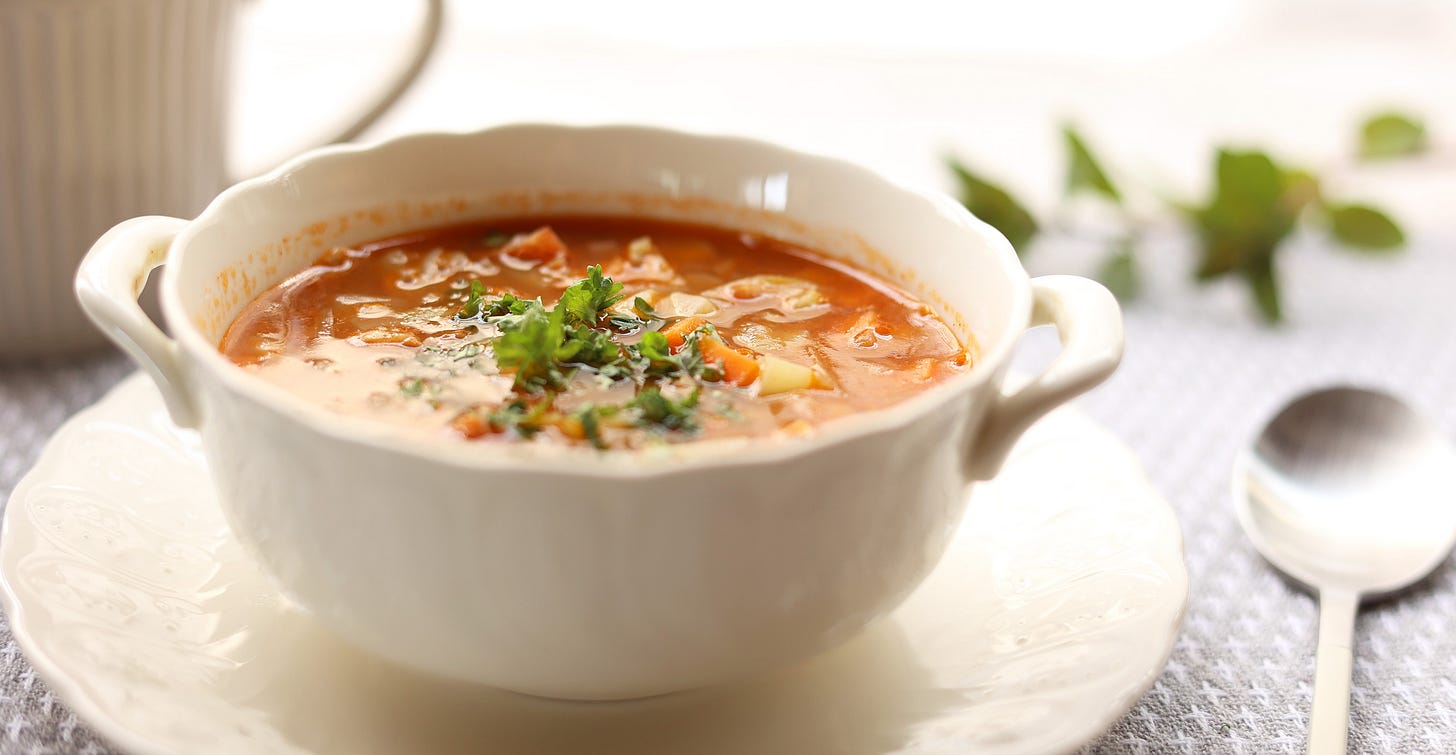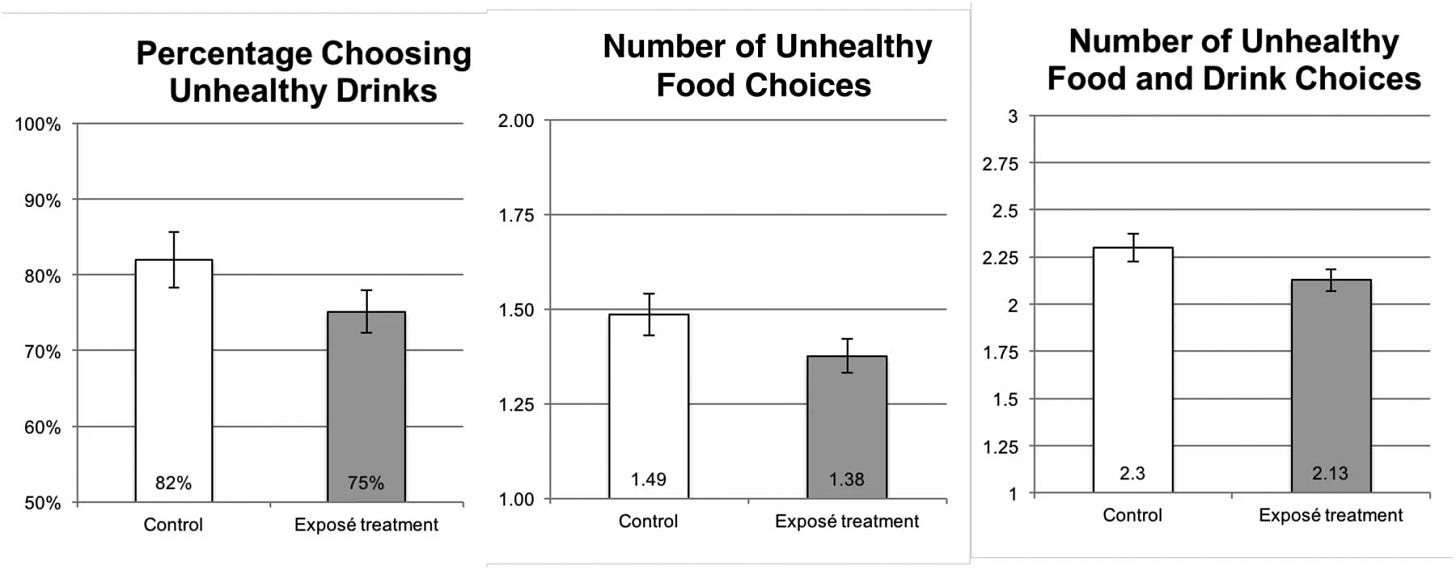Virtuous Tricks That Convince The Obese To Eat Better Food
Helping people struggling with weight loss by sticking it to the man
“Of all corporeal operations, digestion is the one which has the closest connection with the moral condition of man.” — Jean Anthelme Brillat-Savarin, The Physiology of Taste, 82
Muhahah!
I feel so Machiavellian writing that headline.
It’s bunk, of course, because you can’t trick people into virtue — but some tricks might help them realize they want to be virtuous. They might open a Pandora’s box of things worth striving for that are hard to unsee.
So far in this series, we’ve:
Determined that most of the things talking heads claim drive our obesity epidemic miss the mark.
Identified a group of Christians who place moral aspersions on food choice and end up dramatically thinner.
Talked about a non-religious approach to making every decision (including food decisions) freighted with similar but nondogmatic meaning and morality — virtue.
And now we’ll move from theory to practice.
I have no silver bullet for healthy eating adherence — no one does. And as they say, you can take the horse to water, but can’t make them drink.
“Speeches are incapable of exhorting the many to the beautiful and the good.”
— Aristotle, Nicomachean Ethics, 10.9
Many of humanity’s automatic wins have been taken from us, so only those willing to hew to higher standards will escape the effortless, cheap diversions and addictions many are now drowning in.
These techniques might get through to those who can examine their life critically and aim for something that’s not only more utilitarian but ethically better as well. I successfully put them to use while working with many health and weight loss clients for more than a decade.
Filling the Vacuum
“…if people would willingly return to sanity, what need of so many arts that minister to the belly?” — Seneca, Consolation to Helvia, 10.5
To start, we need to acknowledge that for most people with “healthy eating problems,” the cessation or heavy restriction of ultra-pleasurable food rips open one or more vacuums in their life.
I’ve explained how virtue can fill those voids in theory. But how does this happen in practice?
Pointing out the button that motivates people to fill their voids isn’t enough.
Pushing the button that motivates them to fill their voids isn’t enough.
The only chance for long-term success is helping them become enthusiastic self-button-pushing machines, continuously rechristening the void and the actions surrounding it with meaning.
Different people are amenable to different sorts of virtue-based arguments. The “trick,” is obliquely probing till you have a good hunch as to what the most effective one might be. Of course you should never call it virtue. Virtue won’t sell. But ground it in real values and watch people change.
If you can find an argument that will elevate and glorify a higher standard, you may provide them with something that fills the void.
I’ll break these out into several newsletters. First, let’s talk about being a punk.
Sticking It to the Man:
“There is no slavery worse than that which is voluntary,”
— Seneca, Letters, 47.17
A teenager first helped me realize how powerful the “slavery is uncool” argument is for weight loss adherence.
His father lost a lot of weight working with me, but was frustrated that his overweight son wouldn’t give up his soda and junk food diet. He sent him to talk to me to see if I could get through to him.
What pierced the veil of studied teenaged sullenness and “I don’t knows,” was the truth every teenager already knows in their marrow— adults are lame, suckers are uncool, and the line between rocking a hip brand and being “a cuck” to one is quite thin.
The funny thing is that teenagers, for all their sullen idoicy, are often better able to see some truths about our world than adults.
Many adults are kind of lame. They’ve sold their values for comfort and addictions. They’ve settled into self-willed slavery. Young people have (historically) adored Henry David Thoreau because he got this and expressed it with teenager-like disdain.
“The gross feeder is a man in the larva state; and there are whole nations in that condition, nations without fancy or imagination, whose vast abdomens betray them.”
— Henry David Thoreau, Walden, Chapter 11.
A double-blind, randomized, placebo-controlled study of more than 500 Texas eighth graders attempted to test rebellion from food slavery as a driver of change1.
The students read an exposé in the food industry that covered manipulative and deceptive strategies used to make junk food more addictive and to portray the products as healthy. It also included pictures of four executives and consultants of the food industry, described as stereotypical "controlling, hypocritical adult[s]". I thought the essay was too tame, and I don’t buy the conspiracy aspect. I would have said it more forcefully if I’d been trying to incite them. But researchers hoped the kids would choose healthy foods as an act of rebellion and independent thinking.
Later, unaware they were being observed, the students were offered drinks and snacks in an unrelated context, and there was a statistically significant decline in sugar and processed food intake. Two days later, the teenagers in the exposé intervention were angrier in response to sugary drink ads and less tempted to drink the sodas.
Not an overwhelming response, but significant given the tepid intervention, and enough to suggest there might be something to it.
As for that overweight teenager, a similar argument landed. Nabisco, Mountain Dew, and middle-aged Frito-Lay spreadsheet warriors were trying to profit off human weakness. Did he want to go along with it and put himself in shackles? What does the body of a free person look like? What does a sovereign person eat? I played up the punk aspect of diet and how our lives can be a rebellion, and worked with him a few times. I sent him several books.
I heard from his father a year later that he’d lost a bunch of weight. In fact, he was mocking his father’s addiction to Whole Food’s cookies. Better to have him burning with righteous insolence than enslaved; his father seemed to think so, anyway.
The talking heads would advise us that once “access” was taken care of, the right tool for junk food teenagers was “nutrition education” so they can make “better choices.”
That’s BS. This kid knew enough. He was glad to make bad choices — it was a passive rebellion against his parents and his subservient role in society. The desires of his father weren’t high on his list of considerations, and arguments for the utility of healthy foods weren’t going to land.
Reaching him was best done by helping him see — without criticism or urging — that he was cuddled up to something servile he could rebel against. His angst did the rest.
Insolence wasn’t the goal, but this imperfect understanding had a closer proximity to virtue than Cheetos. Unfortunately, this approach is limited by its rebellion against a specific social context. It’s extrinsically motivating, whereas virtue/excellence is a bottomless well of intrinsic motivation.
And of course the argument only works if the messenger isn’t a hypocrite. Kids and teenagers pay attention. They notice when adults are enslaved to their appetites, and who listens to a person like that? Alcoholics aren’t great advocates for teetotaling. Self-willed slaves can’t sell freedom.
The argument works for doom scrolling2, and with adults too, and can be made more subtle. I suspect this is why my article on escaping self-willed slavery is my second most popular.
I you’re battling to eat better and trying to apply this to your life, I have a question for you — do you want to remain enslaved? Philosophers have often concluded that it’s worse than enforced slavery, since chattel slaves are taken against their will.
So do you want to be the weak-willed person who snaps the shackles around their own wrist and throat in return for nothing more significant than some temporary pleasure on your tongue? How many good things will you give up for that ephemeral pleasure?
People have fought for their freedom for millennia. Now, a battle against enslaving pleasures looms before us all. If you decide to fight, you’ll have meaning to fill the looming vacuum ripped open by avoiding unhealthy food.
In a sense, it’s the ultimate revolutionary war, since you’ll war against a tyranny entirely of your own making.
I’ll end with the most punk of all ancient philosophers — Diogenes the Cynic:
“Learn to live on lentils and you will not have to be subservient to the king.”
— Quoted in Diogenes Laertius, Lives of the Eminent Philosophers, 6.37
Thanks for reading Socratic State of Mind.
If you liked this article, please like and share it, which helps more readers find my work.
Bryan, C., Yeager, D., Hinojosa, C., Chabot, A., Bergen, H., Kawamura, M.,
& Steubing, F. (2016). Harnessing adolescent values to motivate healthier
eating. Proceedings of the National Academy of Sciences, 113(39), 10830–10835.
More Than Just Food:
The slavery is uncool argument also works with smartphones and social media addiction.
I sometimes teach partner acrobatics, and three or four years ago I was teaching 17-year-olds. I noticed that on breaks they didn’t talk to each other, joking around and flirting, but mostly stared into their glowing screens like zombies.
Over several weeks I made it a point to occasionally chat about tech companies monetizing and commoditizing users, particularly Mark Zuckerberg, the billionaire wielding algorithms like shackles, and China’s TikTok harvesting data for future use.
I watched some of them come alive with indignation, so I swung for the fences, trying to remember what it was like to be angsty teenager. Is there anything worse than being enslaved and exploited by a bunch of middle-aged spreadsheet warriors? To have our hacked attentions commoditized?
I knew, weeks later, that I must have succeeded when I overheard one of the boys speaking disdainfully of someone “sucking on Zuck’s teat,” or something along those lines.
Several weren’t swayed, but more than half began to keep their phones in their bags during breaks, unprompted, and over several months some life seemed to return to them.





This is a brilliant and effective line of thinking, and I hate to admit it, but it has fueled my own desire to eat better for the past several years. Stopping giving my money to big food in exchange for heart disease and diabetes.
In addition to rebelling against their power, I feel good about buying from local farmers. Also, when we cook things ourselves, we eat less of it. Homemade treats are so much more valuable than factory food.
My wife and I went on a sugar fast over a decade ago and it was hard but we reduced sugar a lot. Now, each January we do the same while adding 'dry January' to the mix. It's an intentional reset and keeps us balanced.
I've also got an essay in mind in 'buy ingredients, not food' which will explore how healthy eating starts with avoiding processed food and that will also dramatically help your food budget.